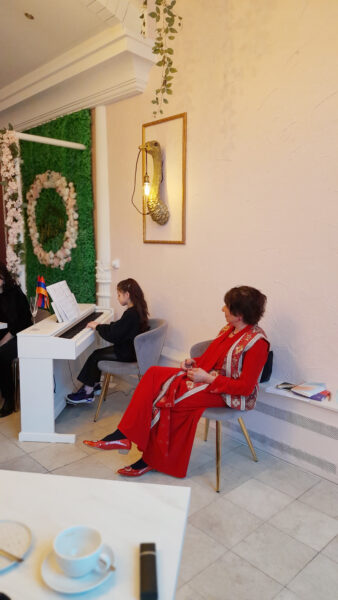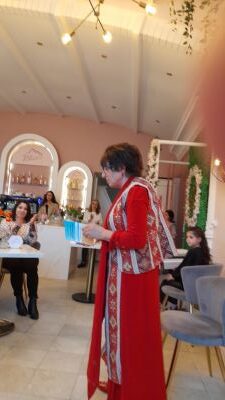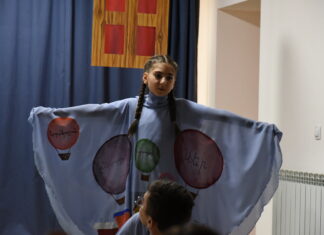WIESBADEN, Germany — The tug-of-war continues over Azerbaijan’s blockade of the Lachin Corridor, in the wake of demands by the International Court of Justice that it be lifted and the deployment of a European Union mission to the area. Azerbaijan, to date, has not budged. In addition to mobilizing political protests and organizing humanitarian support, what can Armenians in the diaspora do?
The answer offered by Agapi Mkrtchian is, “give the Nagorno Karabakh Armenians a voice.” The Armenian author and translator has done so by publishing a volume of poems composed by men and women from Artsakh, in a bilingual Armenian-German edition. Entitled Das Blau streichelt meiner Gedanken Flügel: Armenische Lyrik aus Berg-Karabach/Arzach (Blue Caresses the Wings of my Thoughts: Armenian Poetry from Nagorno-Karabakh/Artsakh, Glaré 2022), the volume contains 30 short pieces by 16 poets. She presented the new volume on March 5 at a well-attended gathering in Café Bliss in Wiesbaden, Germany.
Mkrtchian moved to Germany in 1987 following completion of her studies at Yerevan State University, where she also taught, and Jena University. She continued studies at the Goethe University in Frankfurt, then began her teaching career in German literature in Wiesbaden from 1993 to 2022. Though settled in Germany, she has maintained contact with Armenia and its literary community. As Dr. Lutz Kuntzsch from the Society for the German Language noted in introducing her, Mkrtchian has received awards for her own poetry and prose, as well as translations, from the Armenian Writers Association (2015 and 2022) and the Ministry for the Diaspora (2017).
Mkrtchian provided a brief overview of the history of the conflict from the 19th century, drawing on the Afterword to the new volume, which was written by Dr. Tessa Hofmann. Having maintained correspondence over time with all 16 poets, Mkrtchian travelled to Karabakh last December, and left just two days before the Lachin Corridor was blockaded. She had already considered what her contribution to the struggle might be. Had she been born a man, she said, she would have volunteered for military service. Instead, she decided to use her literary talents to make the voices of those in the beleaguered land heard. Thus, the idea for the anthology.
Men and Women, Young and Old
The poets who have contributed to the collection are all from Karabakh. They span generations; Vova Arzumanyan, the youngest, was born in 2003 and Sokrat Khanyan was born in 1930. Almost all the poets are members of the Writers Union of Armenia and/or Karabakh; several are, or have been, active in journalism, like Aris Arseni, Hermine Avagyan, Asnive Grigoryan, Nemrut, Vitali Petrosyan and Sarine Sarajyan; Professor Vardan Hakobyan, poet and dramatist, is the author of the national hymn of the Republic of Artsakh. Norek Gasparyan was Minister for Youth and Culture in 2007. And some have been active in the military: Aris Arseni was in the underground movement for the liberation of Nagorno-Karabakh. He, along with Gagik Beglaryan, took part in the 1988-1994 war. Komitas Hakobyan died in 1994 in that conflict, at the age of 22. Vitali Petrosyan took part in the war in April 2016 as well as in 2020.









